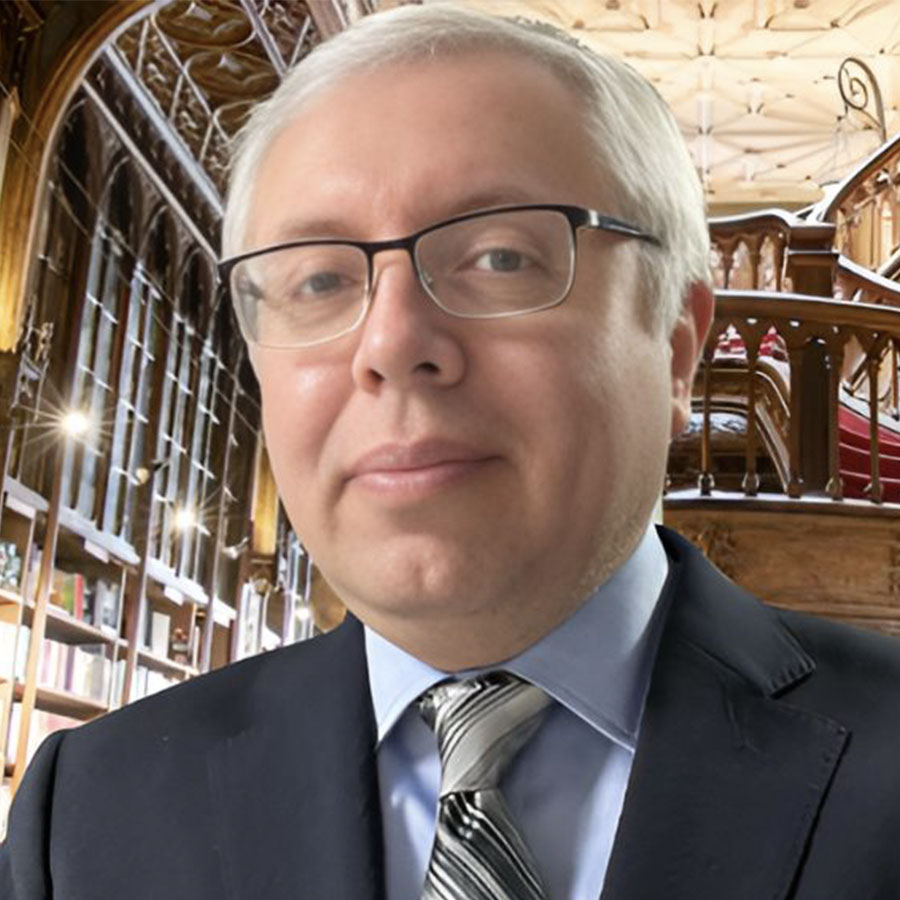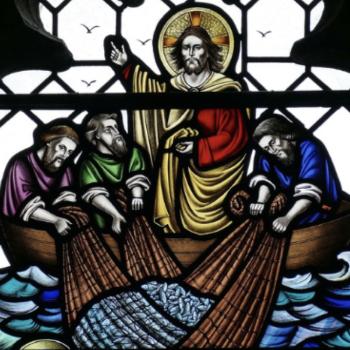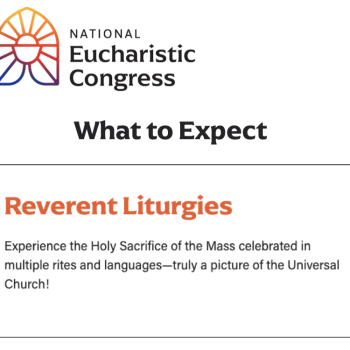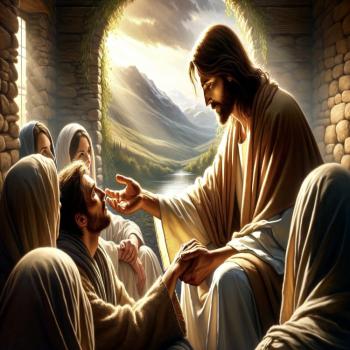
Sunday IV of Lent, the Sunday of joy, Laetare Sunday. Laetare means “rejoice”. The Entrance Antiphon, taken from the book of the prophet Isaiah, says, “Rejoice, Jerusalem, and all who love her. Be joyful, all who were in mourning; exult and be satisfied at her consoling breast.” (Cf. Is 66: 10-11). The incipit of this antiphon, in Latin, reads “Laetare Jerusalem”.
This Sunday is a Sunday that comes to us like an oasis in the middle of the Lenten desert we are crossing. The journey from the desert to Jerusalem in the time of Lent is long. It’s six weeks of Lent. But halfway through the walk we pause, we arrive at an oasis, we cool with its fresh waters and there we leave for a moment the sacrifice, we leave for a moment the penance and rejoice in the Lord, because at the end of the day, where we go is to be witnesses of our salvation.
Since it is a Sunday in which joy is celebrated, you can see that flowers are placed on the altar and also rose is the the color of the liturgical vestments. In Year C, which we dedicate to the Gospel according to St. Luke, we listen to the beautiful parable that is known by many as “The Parable of the Prodigal Son”, although modern Bible scholars —and I among them— prefer to call it “The Parable of the Loving Father”. I’ll explain why later.
Let’s begin by reading the parable. We’ll continue with its exegesis, dissecting the pericope verse by verse. We’ll conclude with a prayer to interiorize what we have found.
The Parable of the Loving Father
Tax collectors and sinners were all drawing near to listen to Jesus, but the Pharisees and scribes began to complain, saying, “This man welcomes sinners and eats with them.” So to them, Jesus addressed this parable:
“A man had two sons, and the younger son said to his father, ‘Father, give me the share of your estate that should come to me.’ So the father divided the property between them. After a few days, the younger son collected all his belongings and set off to a distant country where he squandered his inheritance on a life of dissipation. When he had freely spent everything, a severe famine struck that country, and he found himself in dire need.
So he hired himself out to one of the local citizens who sent him to his farm to tend the swine. And he longed to eat his fill of the pods on which the swine fed, but nobody gave him any. Coming to his senses, he thought, ‘How many of my father’s hired workers have more than enough food to eat, but here am I, dying from hunger. I shall get up and go to my father and I shall say to him, “Father, I have sinned against heaven and against you. I no longer deserve to be called your son; treat me as you would treat one of your hired workers.”’
So he got up and went back to his father. While he was still a long way off, his father caught sight of him and was filled with compassion. He ran to his son, embraced him, and kissed him. His son said to him, ‘Father, I have sinned against heaven and against you; I no longer deserve to be called your son.’ But his father ordered his servants, ‘Quickly bring the finest robe and put it on him; put a ring on his finger and sandals on his feet. Take the fattened calf and slaughter it. Then let us celebrate with a feast, because this son of mine was dead and has come to life again; he was lost and has been found.’
Then the celebration began.
Now the older son had been out in the field and, on his way back, as he neared the house, he heard the sound of music and dancing. He called one of the servants and asked what this might mean. The servant said to him, ‘Your brother has returned, and your father has slaughtered the fattened calf because he has him back safe and sound.’ He became angry, and when he refused to enter the house, his father came out and pleaded with him.
He said to his father in reply, ‘Look, all these years I served you and not once did I disobey your orders; yet you never gave me even a young goat to feast on with my friends. But when your son returns who swallowed up your property with prostitutes, for him you slaughter the fattened calf.’
He said to him, ‘My son, you are here with me always; everything I have is yours. But now we must celebrate and rejoice, because your brother was dead and has come to life again; he was lost and has been found.’”
You know, of course, this parable. Who doesn’t? It’s a beautiful parable and it’s a truly dramatic story. We are not surprised that the only gospel where it appears is precisely the Gospel according to St. Luke, which is the most dramatic gospel of all. But at the same time, it is a story full of mercy. And for stories like this it is precisely that the Gospel according to St. Luke is known as “the Gospel of mercy”.
Immediate Context
The immediate context of this parable are three parables that are known as the “parables of mercy”. One of them is the parable of the lost sheep, another that of the lost drachma, and the third is this one of the loving father
Broad Context
The broad context of this pericope in Lk, is the Ascent to Jerusalem, which we are following throughout Lent, following Jesus to partake with him of the mystery of his Passion, Death and Resurrection.
Actors
The actors involved in the pericope are the publicans and the sinners. And Jesus, of course, as well as the scribes and the Pharisees who criticize them, or who specifically criticize Jesus for welcoming those sinners and those publicans.
In the case of the parable in question, the protagonists are the father who had two children, the youngest son, the eldest son and the owner of those lands who hires the prodigal son and sends him to take care of his swine. And finally, the servants of the Father’s house who appear when the prodigal son returns.
Reading the text through its lines
When we pay attention to the narration, we identify different processes described in detail in the parable: the process of perdition, the process of conversion and the process of forgiveness. Specifically divine forgiveness. By telling this story, Jesus is indirectly addressing the scribes and Pharisees who were questioning him. They are represented by the elder brother, while the sinners they condemn, are represented by the prodigal son. Obviously, God is represented by the father of these two brothers.
The gospel says: “At that time all the publicans and sinners used to approach Jesus.” The publicans were the tax collectors, they were despised by the people of God because they contracted with the Roman Empire to collect taxes from the Jews and give that money to the Romans. Hence, they considered them traitors, traitors to the people of God. And because they are considered traitors to the people of God and because the relationship of the people of God with God is considered a spousal relationship, the Jews compared the publicans —the tax collectors— with prostitutes. Precisely morally they equated them, so much they despised them.
And the fact is that they see here that Jesus interacts, lives with these publicans and also with sinners. And the Pharisees and the scribes murmured, saying, “That one welcomes sinners and eats with them.” Then Jesus, to put them still, tells them this parable. One of the purposes that Jesus has when telling this parable is to teach a lesson precisely to those who are criticizing him for welcoming these sinners. But another purpose that Jesus and Luke have in finally writing this parable is precisely to develop these processes of perdition, conversion and forgiveness.
The process of perdition
Let’s pay attention to what the prodigal son does. A man had two children. The youngest of them said to his father: “Father, give me my share of the fortune.” By asking the father for his inheritance, the son is violating the law. Because, according to the law, it was the father who had to make the decision, he decided when he gave them the inheritance. The first thing we see in this process of perdition is that the son is breaking with the law.
The father distributed the goods to him. Interesting to notice how the father, who represents God, lets his children do what they want. And in fact, that’s right, He has always left us do what we want. How many times have you committed a sin? God has left you. He allows you to do what you want, even if it is wrong, because He respects your freedom. As in the case of the prodigal son, the father distributed the goods to him.
Not many days later, the youngest son, gathering all his, left for a distant country. This is a parable of details we must not overlook. Where is he going? To a distant country. Even if we are not given the name, it is a distant country, which means that he goes as far away from his land as he can. By leaving his land, he is breaking up with his society, he is breaking up with his nation, he is breaking up with his homeland, he is breaking up with his culture. That’s why he goes far away. But, on top of everything, when he goes away from his land, he breaks up with the land of God’s people, he goes far from his land. By going far away, he is also breaking up with God.
And there he lashed his fortune living hopelessly. A totally material life. The only thing that interests him is the material part of life. When he had spent everything, he was left with nothing. A terrible hunger came to that land. In addition to everything, everything gets complicated as much as he can and he began to have a need. It was then that he contracted with one of the citizens of that country. He has to contract with a foreigner, who sent him to his fields to farm pigs. This is the worst thing that could have happened to him. Why? Because for the people of God, pigs are considered impure animals. They can’t be eaten, they can’t be touched by the Jews,, and he’s going to have to take care of them there in his pigsty. Just imagine!
He wanted to be satiated with the carobs that the pigs ate, but no one gave him anything. He could not even eat what the most impure and despicable animals ate before the eyes of the people of God, in the eyes of the Jews. That is, it could not have fallen lower. And notice that it is precisely there, at the lowest, where the conversion process begins.
The process of conversion
The first thing the prodigal son does is rethink. He reconsiders, comes back to himself, because he realizes that he is no longer the same he used to be. He has broken up with everything: He broke with his father, broke with his house, broke with his land, broke with his people, with his nation, with his culture, with his religion. In the end, he stopped being the same. The first thing he does then is rethink. There, at the lowest, when he can no longer fall even lower, the first thing it does is rethink. That is, it comes back to himself. He realizes who he really was and what he has become. He realizes that he is no longer the same.
Then he says to himself: “How many of my father’s day laborers have plenty of bread, while I am starving here? I will get up, I will make my way to my father and say to him: Father, I have sinned against heaven and against you, I no longer deserve to be called your son. Treat me like one of your day laborers.”
So what does the prodigal son intend to do? First of all, he makes a decision: “I’ll get up.” He’s not going to stay in that situation anymore. That’s why he gets up. He gets up to get out of that situation, he gets up to get out of the lowest where he has fallen and where he has fallen as a result of his bad decisions, as a result of his dissipated life, as a consequence of his sins, as a result of having broken with everything he could, including God, including himself and his Father, of course.
Then, he gets up so as not to stay there. First step in conversion: first reconsider, then make the decision and then get up. It’s what he says: “I’ll get up, I’ll get on my way.” He’s making his conversion plan. I’ll get up, I’ll leave this situation, I’ll get on my way, I won’t stay here, I’ll go back. I’ll be on my way to where my father is. He will return to where he really should be. He will return to his father and I will tell him. That is, not only is he going to return, he is also going to confess, he is going to plead guilty. “Father, I have sinned against heaven and I have sinned against you.”
He also intends to amend the damage: “I don’t deserve to be called your son anymore. Treat me like one of your day laborers.”
This is just an idea, it’s just a purpose, it’s just a good intention. But then, “He got up and came to where his father was.” It is at the moment when he stands up that the conversion really ceases to be a good purpose. It’s no longer an idea. In fact, he puts it into practice. He reconsiders, realizes, repents, makes a decision to return, to leave first the condition in which he has gotten himself, to return to where he should be, to confess to himself a sinner, to ask for forgiveness and to amend the damage caused. Later, of course, he puts it into practice: he gets up and came to his father.
The process of divine forgiveness
Now comes the process of forgiveness. And you will see why it is really the parable of the loving father —He is the real protagonist. When his son was still far away, his father saw him. The father gave him the money his son requested and let him leave.
What did the father do all that time when the prodigal son was away? He was probably distressed by him. Surely he was praying for him to come back. Surely he was praying for him to reconsider. But he didn’t retain him or forced him to come back. He’s not going to look for him, but he longs for him to come back. How do we know that he longs for me to come back? Because he’s there watching, actively waiting for him to come back. Still, respecting his freedom.
Our relationship with God is like this. We can go as far as we want, as far away as we choose. God is going to let us. He doesn’t like us to leave, but He’s going to let us leave and to fall as deep as we choose.
Did the father do something to prevent his son from falling into that pigsty with the swine? No, no. He left him, he’s waiting.
Pay attention to the details: When his son was still far away, his father saw him. What did he see him with? With the eyes. With his eyes. And his deep interior is moved. Where does mercy come from? To the Jews, it comes from the mother’s womb.
Mercy, in Hebrew, is said rahamim, which is related to the word rehem, which is the mother’s bosom, where a mother carries her child before its birth. Why? Because there is no love more endearing than a mother’s love for the child she carries in her bosom. Why not? Because the relationship between a mother and her child in her bosom is the closest relationship that can exist between two human beings. This is something we, the fathers, do not count on, but mothers have this great blessing of having her children in their bosom and loving them dearly.
Such connection is so deep that when the baby dwells in the bosom of his mother, the child feeds on what the mother eats. The child listens to what the mother hears. Even the child suffers what the mother suffers. The child is distressed when the mother is distressed. The relationship is truly close, endearing. And the mother loves her child with an endearing love.
That endearing maternal love is what we have translated as mercy. God, our Father, loves us with mother’s love. That’s why his deep interior is moved when he realizes his son is coming back.
Then he runs to his son with his legs, with his feet. He throws himself to his neck with his arms and covers him with kisses with his lips. Do you see? This means that the Father, once he sees his son is coming back, reacts with all his being. With the eyes, reacts his deep interior, with the legs, with the arms, reacts with the lips, reacts with his whole being!
His son said to him, “Father, I have sinned against heaven.” There it is. He makes his confession. “I don’t deserve to call myself your son anymore.” He knows that he has lost the rights to the house when he left.
But pay attention: does the loving father covers his mouth and says: “Calm down, don’t worry, nothing happened.” No, he doesn’t! The Father knows what happened, and it’s been a lot. And he knows everything that the son has lost as a result of his actions.
After letting his son confess his sins, he restores all the rights he has lost. He instructs his servants: “Take out the best robe immediately and put it on.” Why does asks for the best robe to cover his son? Because, having sinned against heaven, having sinned against God, he lost his dignity. In Scripture, nakedness represents the loss of dignity (think of Adam and Eve in Paradise). His loving father will restore his dignity by dressing him with the best robe.
In addition, he puts a ring on his finger. And this has a great symbolism. The rings were, among other things, symbols of authority, and this indicates that the son has authority again inside the house. In addition to the restored dignity, the son regains his authority inside his father’s house.
And besides, he puts sandals on his feet. This has a great symbolism as well. The slaves didn’t wear sandals. Masters did. The prodigal son has become a slave of sin. Now his father is freeing him up from slavery by putting sandals on his feet.
And, of course, in that process of restoration of dignity, authority and freedom, joy is restored. “Bring the fat calf and kill it.” Because this son of mine was dead and has come back to life. He was lost and has been found. And they started partying.
How beautiful forgiveness is. This is the parable of divine forgiveness. This is the loving Father who not only forgives, but restores all the dignity, all the authority and the freedom of his son.
An envious brother
The elder son of the loving father realizes what is happening and becomes jealous. Envy makes him accuse his brother exaggeratedly. Where, in the story, did we see that money was spent on bad women? Never. This is an accusation that the elder brother is inventing to make his brother look even more guilty of what he was. “When this son of yours, who has eaten your goods with bad women, you kill a fed calf”. Not even a small goat for me, being the good son. But for the other one, the worst of all, the best piece of cattle.
The father says to him: “Son, you are always with me and everything that is mine is yours. But it was necessary to celebrate a banquet and rejoice, because this brother of yours was dead and has revived; he was lost and we have found him.”
An important lesson
Beautiful the parable of the loving father. Great lesson for the scribes and the Pharisees. Like the elder brother, they were jealous of the sinners and publicans who came after Jesus, and he received them.
To us, this is an important lesson as well. Through this parable we can learn how we can chose to break up with everything, including God, and He will let us. But we also learn we can repent, and come back to our Father, making him react with all his being, moved by a deep love and mercy. In the end, no matter what we have done, if we truly repent and make of our repentance a true way back to our Father, he will run to embrace us and will restore all the dignity we might have lost.
This is a message of joy, in this Laetare Sunday. And certainly, a message of hope in this Jubilee of Hope!

















